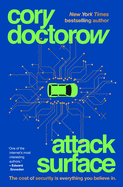
"Yes, it was good opsec," the hacker narrator/hero of Cory Doctrow's alarming digital-security thriller Attack Surface muses about a colleague's hand-soldered, key-encrypted USB sticks, before offering this caveat a couple lines later: "But it was such boy-spy-adventure-novel stuff."
Doctorow's latest, a smart standalone set in the near-future world of his earlier books Little Brother and Homeland, aspires to liberate the globetrotting tech potboiler from the genre's longstanding boyishness. Attack Surface offers clutch-your-throat suspense, especially when its tech surveillance companies seize control of self-driving cars, and in vivid scenes detailing the process of espionage and surveillance, but its story of a spy coming in from the cold is ultimately warm, communal and committed to social justice rather than heroic violence. Much of the story is set in Northern California's East Bay, at protests or at planning sessions powered by vegan soul food, and the camaraderie and idealism prove infections. "Spy Adventure Novel" doesn't cover Doctorow's achievement: this is a Radical Tech Cozy.
The plot follows Masha, a San Francisco whiz kid, out of the shadowy realm of government and private surveillance. She's an engaging protagonist, her seen-it-all jadedness buoyed by the hope she feels in her friends' political organizing--a hope threatened by techniques Masha herself pioneered. Doctorow's depiction of reckless tech companies surveilling, harvesting data and spreading misinformation on behalf of client nations and police departments rings all too true. The book is terrifying, especially because--to borrow a term from the blurbs on a thousand paperback thrillers--it's all so plausible. But its hopefulness is, too. --Alan Scherstuhl, freelance writer and editor

